- Tham gia
- 11/11/2008
- Bài viết
- 9.439
Đầu tháng 6 này, Chủ tịch Microsoft Bill Gates đã quay lại Đại học Harvard để phát biểu tại lễ tốt nghiệp của các sinh viên và nhận bằng Tiến sỹ danh dự Harvard. Tại đây, có khoảng 30.000 người đã trực tiếp theo dõi sự kiện này. Dưới đây xingiới thiệu phần chính bài phát biểu ấy.

Bill Gates phát biểu tại Havard, ngôi trường nơi cách đây 30 năm ông đã bỏ học giữa chừng.
Phần 1 (05:56):
Script:
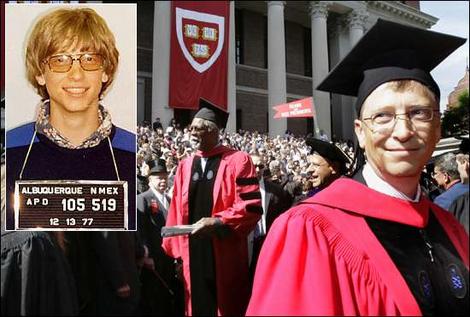
Bill Gates ngày ấy - bây giờ

Bill Gates phát biểu tại Havard, ngôi trường nơi cách đây 30 năm ông đã bỏ học giữa chừng.
Phần 1 (05:56):
Script:
President Bok, former President Rudenstine, incoming President Faust, members of the Harvard Corporation and the Board of Overseers, members of the faculty, parents, and especially, the graduates: I’ve been waiting more than 30 years to say this: “Dad, I always told you I’d come back and get my degree.”
I want to thank Harvard for this timely honor. I’ll be changing my job next year and it will be nice to finally have a college degree on my resume.
I applaud the graduates today for taking a much more direct route to your degrees.
For my part, I’m just happy that the Crimson has called me “Harvard’s most successful dropout.” I guess that makes me valedictorian of my own special class … I did the best of everyone who failed.
But I also want to be recognized as the guy who got Steve Ballmer to drop out of business school.
I’m a bad influence. That’s why I was invited to speak at your graduation.
If I had spoken at your orientation, fewer of you might be here today.
Harvard was just a phenomenal experience for me.
Academic life was fascinating. I used to sit in on lots of classes I hadn’t even signed up for.
And dorm life was terrific. I lived up at Radcliffe, in Currier House.
There were always lots of people in my dorm room late at night discussing things, because everyone knew I didn’t worry about getting up in the morning.
That’s how I came to be the leader of the anti-social group. We clung to each other as a way of validating our rejection of all those social people.
Radcliffe was a great place to live. There were more women up there, and most of the guys were science-math types.
That combination offered me the best odds, if you know what I mean.
This is where I learned the sad lesson that improving your odds doesn’t guarantee success.
One of my biggest memories of Harvard came in January 1975, when I made a call from Currier House to a company in Albuquerque that had begun making the world’s first personal computers.
I offered to sell them software.
I worried that they would realize I was just a student in a dorm and hang up on me.
Instead they said: “We’re not quite ready, come see us in a month,” which was a good thing, because we hadn’t written the software yet.
From that moment, I worked day and night on this little extra credit project that marked the end of my college education and the beginning of a remarkable journey with Microsoft.
What I remember above all about Harvard was being in the midst of so much energy and intelligence.
It could be exhilarating, intimidating, sometimes even discouraging, but always challenging.
It was an amazing privilege – and though I left early, I was transformed by my years at Harvard, the friendships I made, and the ideas I worked on.
But taking a serious look back … I do have one big regret.
I left Harvard with no real awareness of the awful inequities in the world – the appalling disparities of health, and wealth, and opportunity that condemn millions of people to lives of despair.
I learned a lot here at Harvard about new ideas in economics and politics. I got great exposure to the advances being made in the sciences.
But humanity’s greatest advances are not in its discoveries – but in how those discoveries are applied to reduce inequity.
I want to thank Harvard for this timely honor. I’ll be changing my job next year and it will be nice to finally have a college degree on my resume.
I applaud the graduates today for taking a much more direct route to your degrees.
For my part, I’m just happy that the Crimson has called me “Harvard’s most successful dropout.” I guess that makes me valedictorian of my own special class … I did the best of everyone who failed.
But I also want to be recognized as the guy who got Steve Ballmer to drop out of business school.
I’m a bad influence. That’s why I was invited to speak at your graduation.
If I had spoken at your orientation, fewer of you might be here today.
Harvard was just a phenomenal experience for me.
Academic life was fascinating. I used to sit in on lots of classes I hadn’t even signed up for.
And dorm life was terrific. I lived up at Radcliffe, in Currier House.
There were always lots of people in my dorm room late at night discussing things, because everyone knew I didn’t worry about getting up in the morning.
That’s how I came to be the leader of the anti-social group. We clung to each other as a way of validating our rejection of all those social people.
Radcliffe was a great place to live. There were more women up there, and most of the guys were science-math types.
That combination offered me the best odds, if you know what I mean.
This is where I learned the sad lesson that improving your odds doesn’t guarantee success.
One of my biggest memories of Harvard came in January 1975, when I made a call from Currier House to a company in Albuquerque that had begun making the world’s first personal computers.
I offered to sell them software.
I worried that they would realize I was just a student in a dorm and hang up on me.
Instead they said: “We’re not quite ready, come see us in a month,” which was a good thing, because we hadn’t written the software yet.
From that moment, I worked day and night on this little extra credit project that marked the end of my college education and the beginning of a remarkable journey with Microsoft.
What I remember above all about Harvard was being in the midst of so much energy and intelligence.
It could be exhilarating, intimidating, sometimes even discouraging, but always challenging.
It was an amazing privilege – and though I left early, I was transformed by my years at Harvard, the friendships I made, and the ideas I worked on.
But taking a serious look back … I do have one big regret.
I left Harvard with no real awareness of the awful inequities in the world – the appalling disparities of health, and wealth, and opportunity that condemn millions of people to lives of despair.
I learned a lot here at Harvard about new ideas in economics and politics. I got great exposure to the advances being made in the sciences.
But humanity’s greatest advances are not in its discoveries – but in how those discoveries are applied to reduce inequity.

Bill Gates ngày ấy - bây giờ
Hiệu chỉnh:
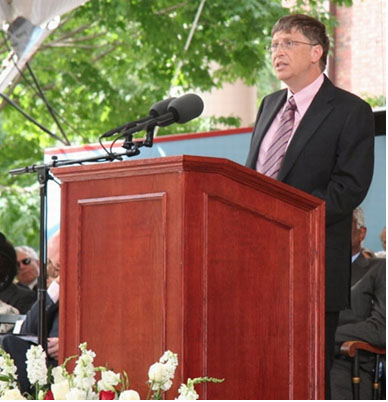
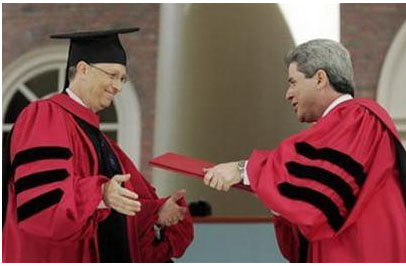
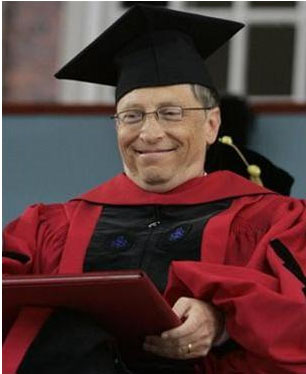
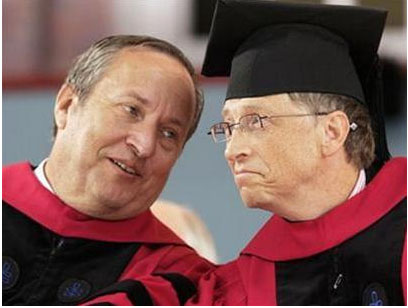
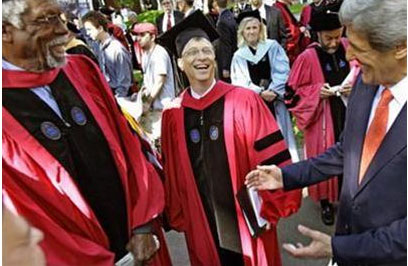
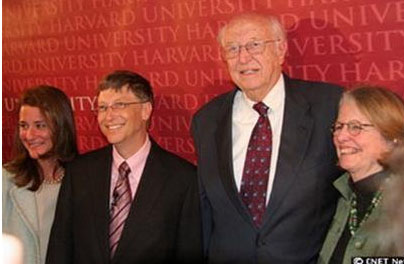
 Bài viết này rất bổ ích, xứng đáng được nhiều người thanks và comment hơn như vậy! Btw, lần đầu tiên thấy công cụ soát bài của KSV hữu ích
Bài viết này rất bổ ích, xứng đáng được nhiều người thanks và comment hơn như vậy! Btw, lần đầu tiên thấy công cụ soát bài của KSV hữu ích 